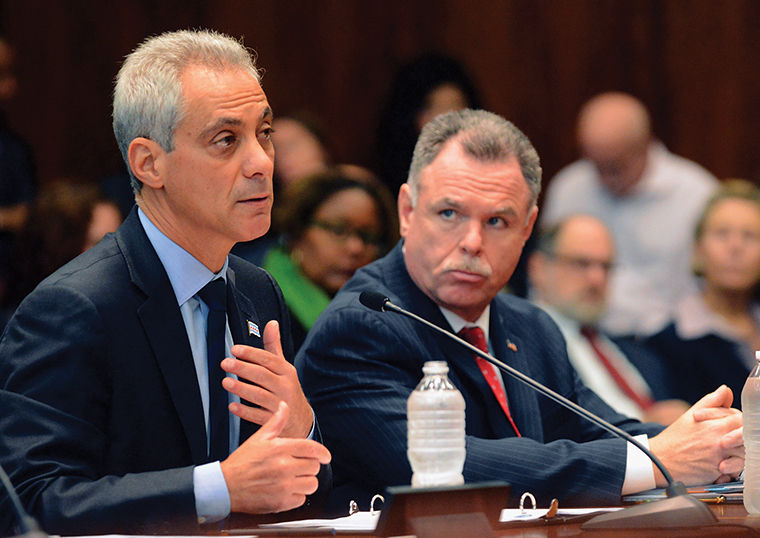Mayor disagrees with challenger on Marijuana Legalization
October 6, 2014
Mayor Rahm Emanuel called on the state legislature to reform sentencing laws for low-level drug offenses, which received an unexpected response from Karen Lewis, a possible mayoral candidate, saying she wanted to completely legalize marijuana in Chicago.
Mayor Emanuel proposed new legislation that would reduce the sentence for possession of one gram or less of any controlled substance in Illinois from a Class 4 felony to a Class A misdemeanor. This law proposal expands on the municipal ordinance passed in 2012 that made possession of 15 grams or less of cannabis a ticketable statewide offense, according to a Sept. 24 press release.
Emanuel said he is lowering the punishment for drug offenses in an effort to reduce non-violent charges on criminal records and to ensure Chicagoans do not have unnecessary difficulties being admitted to college, purchasing a house, receiving scholarships and grants or becoming employed.
Lewis, who is president of the Chicago Teachers Union, said the amount of tax revenue in Colorado increased because of the legalization of marijuana and that Chicago would benefit from following suit.
Lewis said she thinks Emanuel’s plan to ticket for possession is not punitive enough to gain revenue and that Colorado Gov. John Hickenlooper said the state generated $80 million in the first quarter after it legalized marijuana.
“By legalizing [marijuana], we’ll be able to tax it, regulate it and create an entirely new revenue stream for the city or the state,” said Dan Linn, executive director of the Illinois chapter of National Organization to Reform Marijuana Laws.
“In other states, [they] are seeing millions and millions of dollars coming in very quickly from the taxed [pot],” said Jeffrey Raber, CEO of The Werc Shop, a research-based organization that provides plant-based medicines.
Emanuel spoke against Lewis’ proposal at a Sept. 24 press conference at the Shedd Aquarium.
“[Illinois] should not balance the budget by promoting the recreational smoking of pot,” Emanuel said.
Emanuel also said his efforts toward making Chicago a smoke-free city would be undermined by legalizing marijuana for recreational purposes at the press conference.
“Twenty years ago, people used to talk about having a tobacco-free, smoke-free generation,” Emanuel said at the press conference. “We’re at 91 percent. That’s no longer aspirational—that’s actually obtainable. We have fewer kids smoking cigarettes [and] we balance the budget without any tax increases. I don’t think the way to balance a budget is to promote smoking of marijuana.”
Despite Emanuel’s goals for the state, there are other benefits to legalizing marijuana, Linn said.
“One of the other benefits that gets understated in this whole debate is that if we legalize it, we would be able to have regulated producers and distributors of cannabis,” Linn said. “Likely, they would have some type of age restriction of who could use it and would be able to prevent young people from getting access to it because whoever is selling it would ask for an ID, whereas now, because it’s illegal, you only have criminals selling it, and they don’t have any motivation to ask for their customers IDs or not to sell it to underage patrons.”
Linn also said he thinks if Illinois legalizes marijuana, lawmakers in Springfield need to make a new law and ultimately change federal policy to refine cannabis use before lawmakers can make marijuana completely legal.
These additional benefits could also contribute to the reduced presence of gangs and violence in Chicago, Linn said.
“We could see a reduction in the gang violence in Chicago because [in] the illegal drug trade and the illegal cannabis trade, there isn’t any mechanism for dispute resolution,” Linn said. “There’s fighting over distribution turf, and there’s a whole other host of problems with an unregulated illegal product that could be alleviated if we were to legalize and regulate it.”








